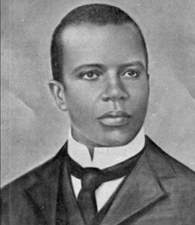American composer Scott Joplin, the “King of Ragtime,” composed dozens of legendary ragtime songs in the late 1800s and early 1900s, including such iconic pieces as “Maple Leaf Rag” and “The Entertainer.”
Scott Joplin’s Early Days
The details of Scott Joplin’s early life are not well documented. Historians previously accepted November 24, 1868, as Joplin’s birthday, but that may not be correct. Joplin was born in northeast Texas to Florence Givens, a freeborn African-American, and Giles Joplin, a former slave. Giles Joplin worked as a laborer to support his family.
Scott Joplin began playing piano at the age of seven at a neighbor’s house while his mother cleaned. Both of Joplin’s parents were musicians, and Giles Joplin taught his children to play the violin from an early age. In the early 1880s, Giles Joplin left his family to live with another woman, leaving Florence to support her three sons. In spite of her humble means, Joplin’s mother bought him his first piano in the early 1880s.
A local German immigrant, Julius Weiss, noticed young Joplin’s musical talent and began to teach him about classical music. Information on Joplin’s teenage years is hazy, but it is thought that he left home as a teen and attended high school in Missouri before setting out as a traveling musician. Joplin apparently earned money by playing piano and cornet at saloons, social clubs and events across the country, including in St. Louis.
Sources in this Story
- The Scott Joplin International Ragtime Foundation: A Biography of Scott Joplin
- Encyclopedia.com (Contemporary Black Biography): Joplin, Scott 1868–1917
- AllMusic: Scott Joplin Biography
- Classic Ragtime Piano: Scott Joplin—The King of Ragtime Writers
Joplin’s Notable Accomplishments
The earliest documented information about Joplin’s musical career is a newspaper article from Texarkana, Texas, in 1891 praising Joplin’s local music troupe. In 1893, Joplin was sighted at the Chicago World’s Fair, where he became friends with pianist Otis Saunders. Joplin settled in Sedalia, Missouri, where he published his first musical compositions.
In 1899, local publisher John Stark bought the rights to one of Joplin’s compositions, “Maple Leaf Rag.” By 1909, “Maple Leaf Rag” had sold a half-million copies.
In 1901, Joplin and Stark moved to St. Louis, where Joplin wrote many famous ragtime songs, including “The Entertainer,” “The Easy Winners” and “Elite Syncopations.” In 1904, Joplin performed “The Cascades” at the St. Louis World’s Fair, which became his second big hit. In 1907, Joplin moved again, this time to New York, where he continued to publish and perform ragtime songs.
Listen to several of Joplin’s best-known works on Last.fm, including “The Maple Leaf Rag,” “The Entertainer” and “The Easy Winners.”
The Man and his Work
- “Scott Joplin: His Complete Works”
- “Complete Piano Music of Scott Joplin”
- “Scott Joplin: The Entertainer: Classic Ragtime from Rare Piano Rolls”
- “Scott Joplin’s Treemonisha”
- “King of Ragtime: Scott Joplin and His Era” by Edward A. Berlin
The Rest of the Story
From 1911 until his death on April 1, 1917, Joplin devoted a great deal of effort to promoting his opera, “Treemonisha.” In spite of favorable reviews, Joplin was never able to stage a complete performance. He died in New York from complications resulting from his long battle with syphilis.
Joplin is credited as being the father of American ragtime music. During the 1970s, there was a resurgence of interest in ragtime and Joplin’s work: “Treemonisha” was finally produced on Broadway, Joplin’s music was used for the Academy Award-winning score of the film “The Sting” and in 1976, he was awarded a posthumous Pulitzer Prize for his contributions to American music. Joplin’s face was featured on a U.S. stamp in 1983.
This article was originally written by Caleb March; it was updated November 26, 2017.











